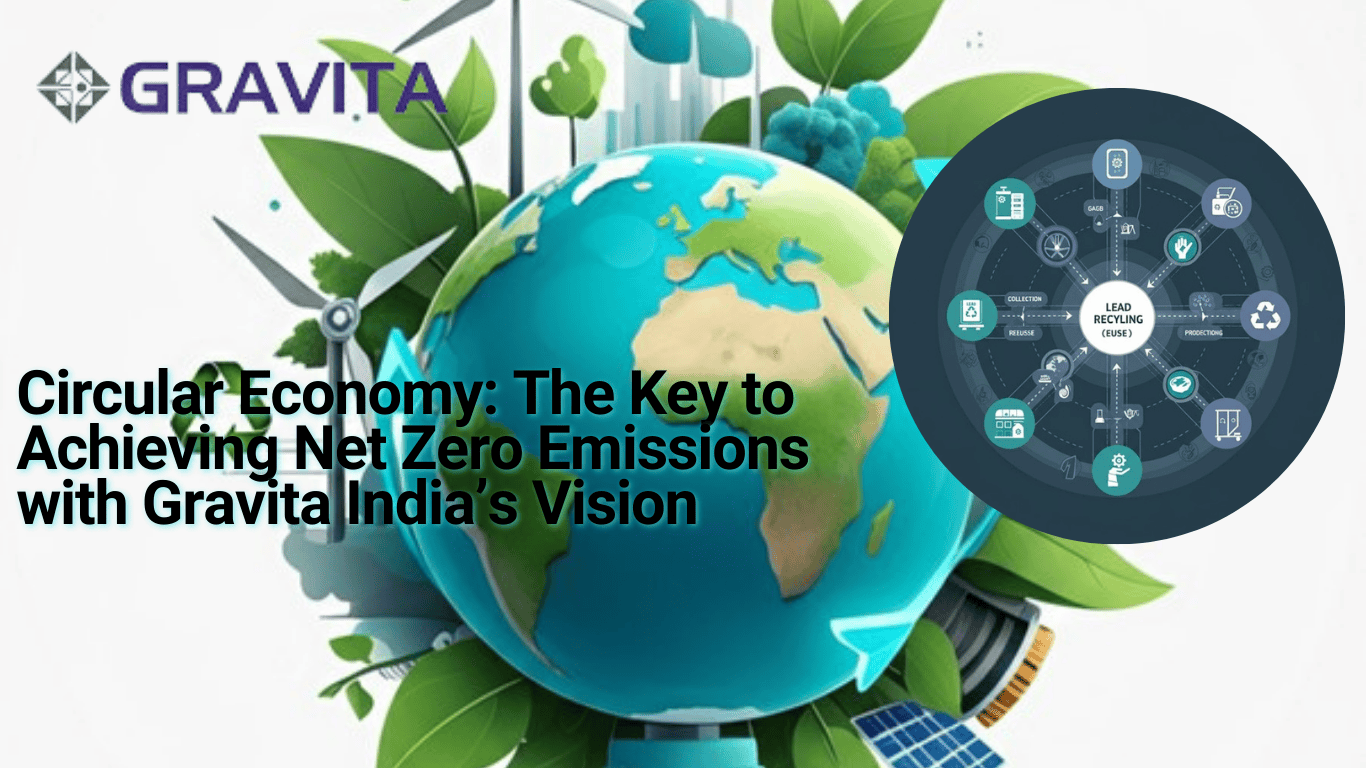
The growing urgency for global sustainability has prompted industries worldwide to adopt the circular economy as a transformative solution. By moving beyond the traditional linear "take, make, dispose" model, the circular economy minimizes waste and optimizes resource efficiency. Gravita India, a trailblazer in innovative recycling practices, epitomizes how these principles can help industries meet their net zero emissions goals.
What is the Circular Economy?
The circular economy is a forward-thinking approach to production and consumption that revolves around recycling, reusing, and reducing waste. Unlike the extractive linear models, this system extends product lifecycles, decreases consumption of raw materials, and reduces the environmental impact of industrial processes.
By designing products and systems aimed at waste reduction, the circular economy not only lessens the strain on ecosystems but also unlocks economic opportunities. The global transition to this model plays a vital role in addressing key sustainability challenges, such as combating greenhouse gas emissions and preserving finite natural resources. Gravita India actively implements these practices, aligning them with its quest for sustainable development and net zero ambitions.
How the Circular Economy Supports Net Zero Goals
Achieving net zero emissions requires a delicate balance of cutting emissions and enhancing removals. The circular economy supports this milestone in several ways:
• Minimizing Waste: By prioritizing waste reduction, circular practices curb methane emissions generated by landfills.
• Energy Conservation: Utilizing recycled materials demands less energy compared to extracting and processing virgin raw materials. For example, aluminium recycling consumes just 5% of the energy required to produce primary aluminium.
• Resource Efficiency: The circular model decreases dependence on raw materials, alleviating the environmental burden of activities like mining and deforestation.
When industrial sectors adopt these principles, they can significantly lower their carbon footprint while conserving energy and supporting sustainability initiatives. Gravita India exemplifies these efforts through its innovative business strategies.
Gravita India’s Role in Leveraging Circular Economy Principles
Gravita India is leading the charge in creating sustainable industrial ecosystems by embedding the circular economy into its core processes. Its focus on lead recycling, aluminium recycling, and plastic waste management demonstrates how these practices can drive sustainable supply chains while addressing global environmental challenges.
1. Cutting-Edge Lead Recycling
Gravita India has established itself as a pioneer in lead recycling, efficiently transforming used lead-acid batteries and other waste into valuable raw materials. This method:
• Drastically cuts the need for fresh lead mining, a process that is harmful and energy-intensive.
• Prevents hazardous materials from polluting the environment.
• Perfectly encapsulates the principles of the circular economy while lowering emissions.
2. Aluminium Recycling for Energy Efficiency
The company’s focus on aluminium recycling not only conserves resources but also achieves significant energy savings. The process reduces reliance on primary production, which generates a high volume of greenhouse gas emissions, thereby contributing to Gravita’s net zero emissions strategy.
3. Combatting Pollution Through Plastic Waste Management
Plastic waste is a global crisis, but Gravita India’s plastic waste management initiatives provide a proactive solution. By transforming discarded plastic into reusable industrial materials, Gravita ensures:
• Reduced dependency on fossil fuel-based virgin plastics.
• Averted pollution of oceans and landfills.
• The promotion of resource efficiency and lower-energy production.
4. Driving Sustainability Through Global Collaboration
Gravita India extends its reach through global collaboration, recycling waste materials across over 70 countries. This expansive network reinforces sustainable supply chains, demonstrating how industries can work together for worldwide impact under the circular economy paradigm.
The Tangible Environmental Impacts Achieved by Gravita India
Through its dedication to recycling and circular operations, Gravita India has made measurable contributions to global sustainability efforts. The company:
• Prevents toxic substances like lead from polluting ecosystems.
• Saves enormous amounts of energy through efficient recycling processes.
• Reduces emissions by repurposing waste into high-quality industrial products.
These efforts highlight how seamlessly the adoption of circular economy principles can integrate into business strategies while delivering lasting environmental and economic benefits.
Why Industries Must Prioritize the Circular Economy
The shift to the circular economy is vital for industries aspiring to reduce their environmental impact and achieve net zero emissions. By adopting these sustainable strategies, industries can:
• Minimize reliance on finite resources.
• Actively reduce their greenhouse gas emissions.
• Cultivate greener, more resilient supply chains.
Gravita India’s forward-thinking strategy demonstrates that profitability and sustainability are not mutually exclusive. Instead, they form the foundation of a future where industrial growth aligns harmoniously with environmental stewardship.
Unleashing the Potential of the Circular Economy
The circular economy is not merely a policy directive or trend—it’s a powerful tool that aligns business objectives with global sustainability goals. Gravita India’s commitment to integrating recycling and resource efficiency highlights what industries can achieve by shifting towards circularity. By fostering global collaboration, reducing waste, and cutting emissions, businesses like Gravita India are charting a path to a sustainable future.
With such initiatives paving the way, we have the means to create a world where environmental preservation thrives alongside economic progress—proving that the circular economy holds the key to achieving net zero emissions.



